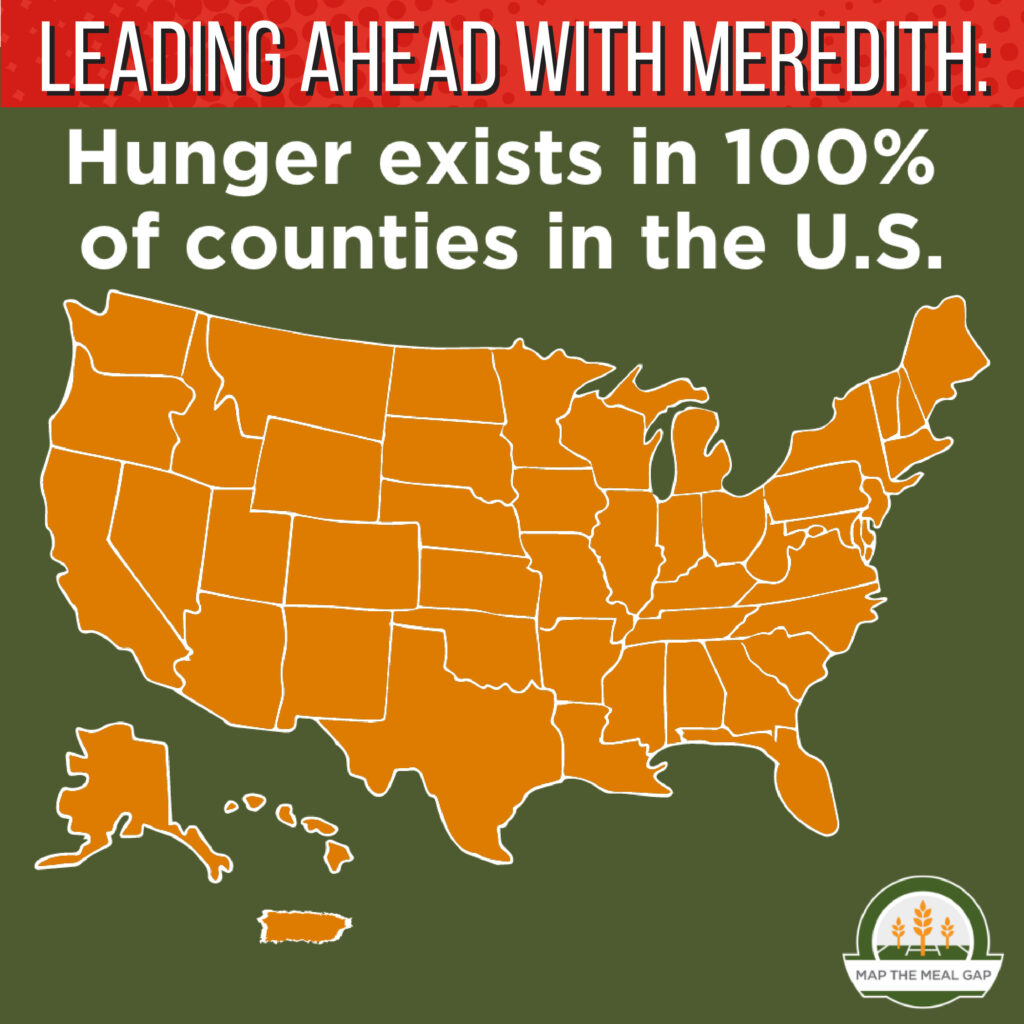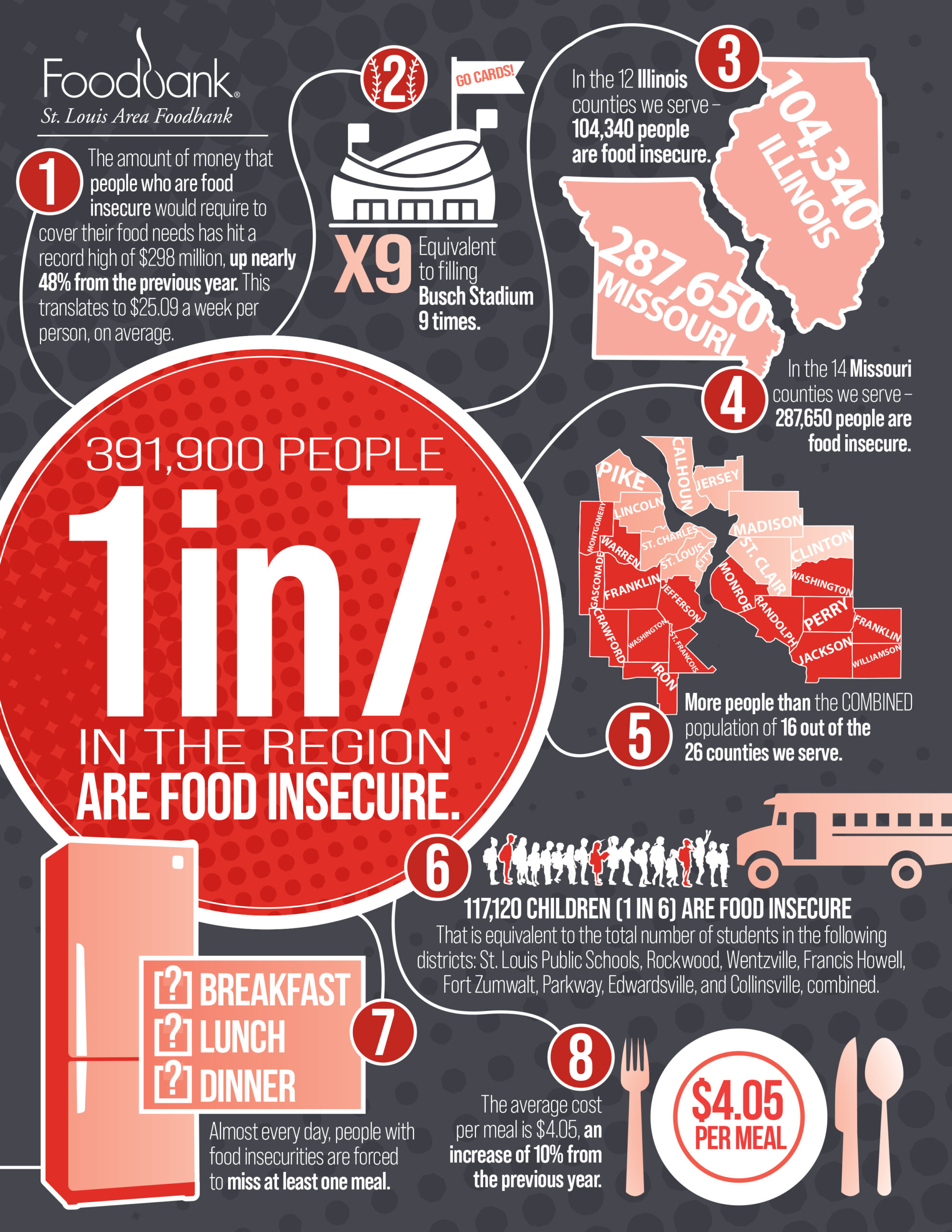
Feeding America’s Map the Meal Gap!
Meredith Knopp
Today Feeding America released publicly the annual “Map the Meal Gap” results. Map the Meal Gap (MMG) is Feeding America’s annual study on local food insecurity and food cost. The 2024 release features data as of 2022, the most recent year available.
The insights from this year’s study confirm what we hear from people facing hunger: elevated food prices and overall inflation are making hunger in America worse. This powerful tool helps us understand the local impact of food insecurity and underlines that we can choose to end hunger in America by coming together as a nation.
The extra money that people facing hunger said they need to have enough food reached its highest point in the last 20 years, according to Feeding America’s annual Map the Meal Gap study. At the local level, Map the Meal Gap finds that nearly 400,000 (1 in 7) people are food insecure in the Greater St. Louis community. The St. Louis Area Foodbank is one of more than 200 food banks that are part of Feeding America’s nationwide food bank network addressing this need.
Food insecurity affects every community in the United States. Map the Meal Gap is the only study providing local-level estimates of food insecurity and costs for every county and congressional district. The study builds upon the USDA’s latest report of national and state data, which showed a sharp increase in food insecurity in 2022 amidst historically high food prices and the expiration of many pandemic-era programs. Map the Meal Gap emphasizes the urgent call to take action.
The St. Louis Area Foodbank is addressing these needs by distributing more than 47 million pounds of food directly through innovative programming (including mobile food markets and school markets) and partnerships with almost 600 local partners (food pantries, homeless shelters, soup kitchens, and places of worship). The Foodbank relies heavily on the generosity of its donors and volunteers to nourish people, empower communities, and transform systems throughout 26 counties in Eastern Missouri and Southwestern Illinois.
Other key findings of Map the Meal Gap include:
Local Food Insecurity:
- 391,900 people (1 in 7) in the bi-state region are food insecure.
- Of the 26 counties St. Louis Area Foodbank serves, food insecurity ranges from a low of 8.4% (1 in 12 people) in Monroe County, Illinois to 19.5% (1 in 5 people) in Iron County, Missouri.
- 117,120 (1 in 6) children are food insecure. That is equivalent to the total number of students in the following districts: St. Louis Public Schools, Rockwood, Wentzville, Francis Howell, Fort Zumwalt, Parkway, Edwardsville, and Collinsville, COMBINED.
Income and Food Spending:
- The bi-state region food budget shortfall, which reflects the extra money that people who are food insecure report needing to cover their food needs, has hit a record high of $298 million, up nearly 48% from the previous year. This translates to $25.09 a week per person, on average.
Food Costs and Meal Prices:
- The average cost per meal in the bi-state region has increased to $4.05, marking nearly a 10% increase compared to the prior year and reaching its highest point in the last two decades, even after adjusting for inflation.
- Throughout the bi-state region, meal costs vary significantly by county, ranging from $3.53 to $4.60. This range showcases the variety of economic challenges faced by local communities.
These results, while sobering, only strengthens the resolve of the St. Louis Area Foodbank to lead the way in our community, collaborating with community partners, businesses, and volunteers to innovate and find ways to provide realistic pathways out of food insecurity for families across the bi-state region. To learn more about how you can join us, please visit: www.stlfoodbank.org.


